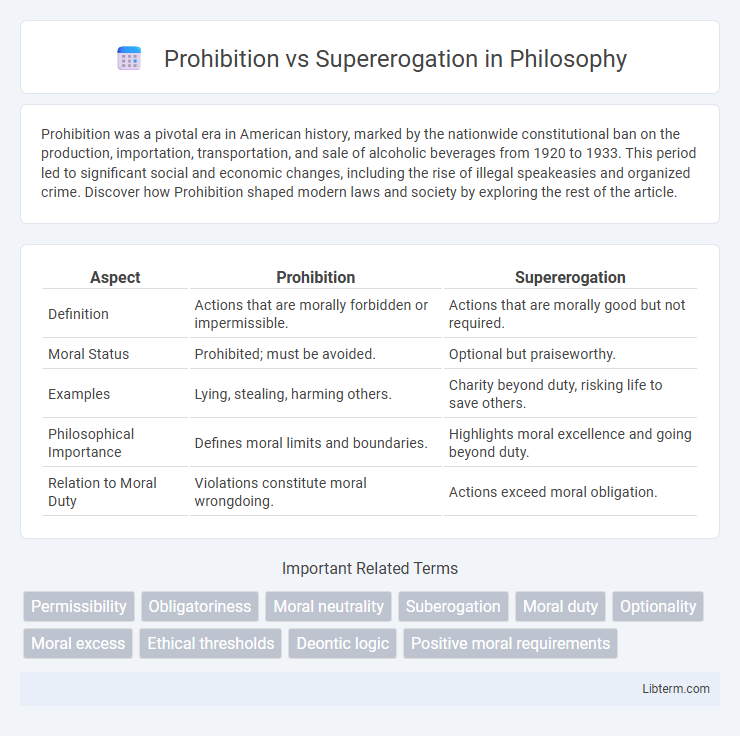Prohibition was a pivotal era in American history, marked by the nationwide constitutional ban on the production, importation, transportation, and sale of alcoholic beverages from 1920 to 1933. This period led to significant social and economic changes, including the rise of illegal speakeasies and organized crime. Discover how Prohibition shaped modern laws and society by exploring the rest of the article.
Table of Comparison
| Aspect | Prohibition | Supererogation |
|---|---|---|
| Definition | Actions that are morally forbidden or impermissible. | Actions that are morally good but not required. |
| Moral Status | Prohibited; must be avoided. | Optional but praiseworthy. |
| Examples | Lying, stealing, harming others. | Charity beyond duty, risking life to save others. |
| Philosophical Importance | Defines moral limits and boundaries. | Highlights moral excellence and going beyond duty. |
| Relation to Moral Duty | Violations constitute moral wrongdoing. | Actions exceed moral obligation. |
Defining Prohibition: What Is Forbidden?
Prohibition refers to the explicit forbiddance of certain actions or behaviors deemed unacceptable or harmful within ethical, legal, or social frameworks. It establishes clear boundaries by defining which conduct is not permitted, such as laws prohibiting theft, murder, or discrimination. Understanding prohibition requires identifying specific actions that are categorically barred to maintain order, protect rights, and uphold moral standards.
Understanding Supererogation: Going Beyond Duty
Supererogation refers to actions that exceed moral duty, going beyond what is required or obligatory to perform good deeds. Unlike prohibition, which restricts or forbids certain behaviors, supererogation involves voluntary acts of kindness or generosity that are commendable but not mandatory. Understanding supererogation highlights the ethical space where individuals choose to contribute positively without obligation, enhancing moral philosophy discussions.
Key Differences Between Prohibition and Supererogation
Prohibition denotes actions that are explicitly forbidden by laws, rules, or moral codes, often accompanied by penalties for violations. Supererogation involves actions that go beyond moral duty or obligation, representing morally praiseworthy deeds without requirement or expectation. The key difference lies in prohibition's mandatory restriction versus supererogation's voluntary and commendable nature.
Ethical Foundations: Moral Theories Behind Each Concept
Prohibition is grounded in deontological ethics, emphasizing duties and rules that forbid specific actions based on moral obligations, often derived from Kantian or religious frameworks. Supererogation arises from consequentialist or virtue ethics, encouraging actions that go beyond moral duty by promoting generosity or excellence without being morally required. The ethical foundations distinguish prohibition as obligatory restraint, while supererogation highlights voluntary moral praise.
Everyday Examples of Prohibited Actions
Prohibition refers to actions that are expressly forbidden by law, ethics, or social norms, such as stealing, speeding, or smoking in non-designated areas. These prohibited actions carry clear legal or moral penalties to prevent harm and maintain order. Distinguishing them from supererogatory acts helps clarify behaviors that are required versus those that are commendably beyond duty.
Real-World Cases of Supererogatory Acts
Supererogatory acts, unlike prohibitions, involve voluntary actions that exceed moral duty, such as whistleblowers exposing corporate corruption despite personal risks. Real-world cases include healthcare workers who provide care during pandemics beyond their contractual obligations and individuals donating significant portions of their income to alleviate global poverty. These acts exemplify moral excellence by voluntarily contributing to societal welfare without legal compulsion.
The Role of Intention in Prohibition and Supererogation
Intention plays a pivotal role in differentiating prohibition from supererogation by determining the moral weight of an action. Prohibition involves intentional acts that are morally or legally forbidden due to harmful or unethical motives, whereas supererogation encompasses actions that go beyond duty, driven by altruistic or benevolent intentions. Understanding the actor's intent helps clarify moral responsibility and the ethical significance of exceeding moral obligations or violating prohibitions.
Social and Legal Implications
Prohibition mandates actions or behaviors forbidden by law or social norms, ensuring public safety and order through legal sanctions that discourage deviance. Supererogation involves voluntary actions beyond duty, often praised morally but lacking legal enforcement, which highlights challenges in codifying ethical excellence within legal frameworks. The tension between these concepts shapes societal expectations and legislative boundaries, influencing compliance, moral motivation, and the scope of legal intervention.
Philosophical Debates: Where Do We Draw the Line?
Philosophical debates on prohibition versus supererogation hinge on defining moral boundaries where obligations end and acts of moral excellence begin. Prohibition dictates actions that must be avoided due to ethical imperatives, while supererogation encompasses voluntary, praiseworthy acts exceeding duty. Determining the line involves examining normative ethics theories, such as deontology and consequentialism, to assess where obligatory behavior concludes and commendable generosity starts.
Balancing Prohibition and Supererogation in Ethical Decision-Making
Balancing prohibition and supererogation in ethical decision-making requires recognizing actions that are morally obligatory versus those that go beyond duty to promote greater good. Prohibitions set clear boundaries preventing harm and unethical conduct, while supererogatory acts encourage individuals to exceed minimum moral standards through altruistic behavior. Effective ethical frameworks integrate both principles to guide decisions that uphold essential norms and inspire virtuous excellence.
Prohibition Infographic

 libterm.com
libterm.com